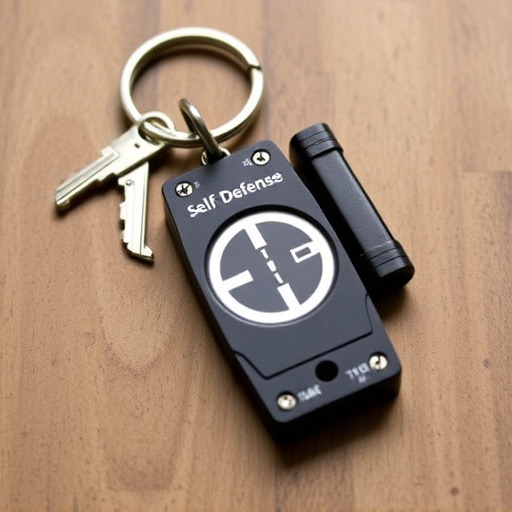In US states, regulations regarding concealable keychain weapons like pepper spray or stun guns vary greatly, with some permitting them for women's self-defense and others having strict restrictions. Before carrying such a weapon, research state laws on open/concealed carry without a permit, licensing requirements including background checks, and local ordinances. Ensure the weapon complies with all rules to avoid legal repercussions, as these "Concealable Keychain Weapons for Women" often fall into a legal grey area. Prioritize safety through responsible use, regular testing, awareness, compliance, and self-defense training.
In today’s world, personal safety is a top priority, especially for women seeking effective self-defense options. One compact solution gaining popularity are concealable keychain weapons designed for easy carry and quick access. However, understanding state laws regarding these tools is crucial before exercising your right to protect yourself. This article guides you through the legal requirements for carrying keychain self-defense devices, offering insights into what you need to know before purchasing and best practices for safe use.
- Understanding State Laws on Concealable Keychain Weapons
- Legal Requirements for Carrying Self-Defense Keychains
- What You Need to Know Before Purchasing a Keychain Weapon
- Safety Measures and Best Practices for Using Keychain Self-Defense Tools
Understanding State Laws on Concealable Keychain Weapons
In many states across the US, the possession and carrying of concealed weapons, including concealable keychain weapons, are regulated by strict laws. For women considering a self-defense keychain, understanding these state-specific regulations is paramount. The legal definition of a concealable weapon varies from state to state, but typically includes small, easily hidden devices designed for personal protection. These can be keychains with built-in pepper spray, stun guns, or other similar tools.
Women looking to arm themselves for self-defense should research their state’s specific laws regarding the carrying of concealable keychain weapons. Some states allow qualified individuals to carry such devices openly or concealed without a permit, while others mandate the obtaining of a license or permit. Permit requirements often include background checks and training courses, ensuring that only responsible individuals can exercise their right to self-defense.
Legal Requirements for Carrying Self-Defense Keychains
When considering self-defense keychains, it’s crucial to understand the legal requirements that govern their carriage in your state. These laws vary widely, and what may be permitted in one location might not hold true for another. For instance, some states explicitly allow concealable keychain weapons, especially for women seeking personal safety options, while others have stringent restrictions on the types of self-defense tools that can be carried openly or concealed.
In many jurisdictions, self-defense keychains fall under the broader category of “concealable weapons,” and their legality hinges on factors such as blade length, weight, and design. It’s essential to check your state’s specific definitions and regulations regarding what constitutes an acceptable self-defense keychain weapon. Additionally, local ordinances in cities or towns may impose further restrictions, so understanding both state and local laws is vital before carrying a concealed keychain for self-defense.
What You Need to Know Before Purchasing a Keychain Weapon
Before purchasing a keychain weapon, especially designed as a concealable option for women, it’s crucial to understand your state’s legal requirements. Not all states permit the open or concealed carry of firearms, and these laws vary greatly from one state to another. Even within a single state, local ordinances can further restrict where and how you may legally carry such a device.
Keychain weapons, often marketed as defensive tools for personal safety, fall into a legal grey area in many places. Some states classify them as prohibited or restricted items due to their compact size and potential for misuse. Ensure that the weapon you choose complies with local and state regulations, and remember that possession without proper licensing could lead to severe legal consequences.
Safety Measures and Best Practices for Using Keychain Self-Defense Tools
When carrying a keychain self-defense tool, it’s crucial to prioritize safety and responsible use. These concealable keychain weapons for women are designed as a last resort, so it’s essential to understand and practice best practices. Always ensure your tool is easily accessible in case of an emergency but discreetly hidden to avoid attracting unnecessary attention. Regularly test the functionality of your self-defense keychain by practicing proper deployment techniques. Keep it within reach yet strategically placed, allowing for quick and calm response during a potential threat.
Additional safety measures include familiarizing yourself with local laws regarding self-defense tools, ensuring you have permission to carry in public spaces, and being aware of your surroundings at all times. It’s also beneficial to enroll in self-defense classes to gain confidence and learn effective physical techniques to accompany the use of your keychain weapon. Remember, the primary goal is to deter and escape a dangerous situation, not engage in combat.
When considering a concealed keychain weapon as a means of self-defense, it’s crucial to understand both the legal requirements and safety practices specific to your state. For women looking for discreet personal security, concealable keychain weapons offer a convenient option. However, before purchasing, ensure you’re aware of local laws regarding their carrying. By adhering to legal guidelines and implementing best practices, such as proper training and responsible storage, individuals can effectively utilize these compact self-defense tools while prioritizing safety and legality.
